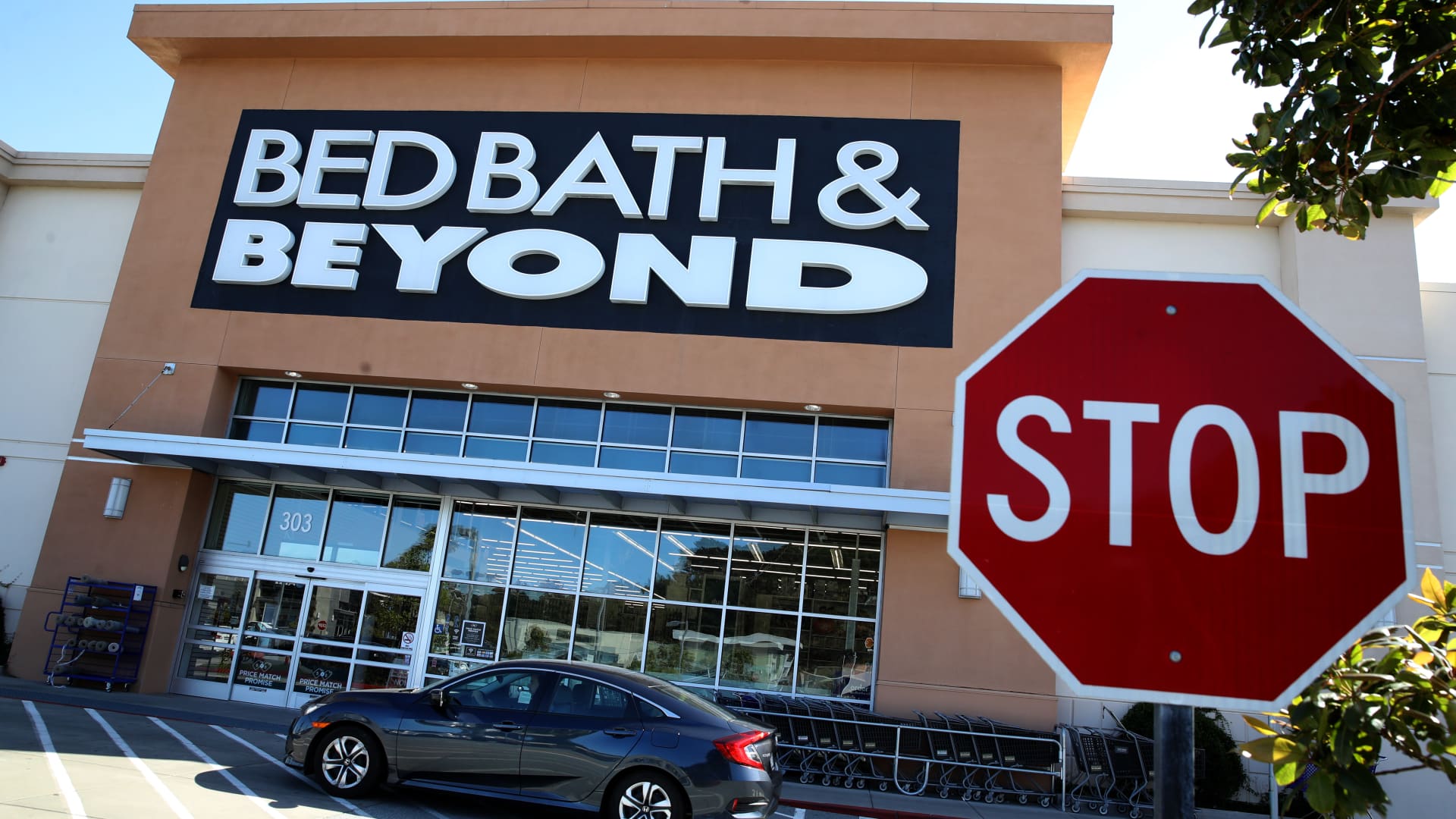
Before the memes, there was cannabis stock Tilray Brands (TLRY) and before that Beyond Meat (BYND). Both had similar moments of market euphoria and subsequent despair. The latest blowup is Bed Bath & Beyond (BBBY). But meme-mania started back in January 2021, when a bunch of Reddit users on the WallStreetBets forum got together to crush the shorts on GameStop (GME). We made a study of the meme short-squeeze and their moments of undoing on Wednesday’s “Morning Meeting” for Club members. (In a short squeeze, a stock is unnaturally bid higher by short sellers buying back stock to close out positions.) We never expected the undoing would happen so fast. Let me give you the figures so you know. When we looked — subjectively of course — at short squeeze activity when the move was complete, it was almost always followed by an intense amount of pain, as much as 12% on average when it comes to the Nasdaq ; never mind that some of the biggest meme stocks such as GameStop and AMC Entertainment (AMC) are listed on the New York Stock Exchange. Why is this? You can see Friday. Bed Bath & Beyond, a Nasdaq-listed stock, fell more than 40% after it was confirmed that activist investor Ryan Cohen sold his entire stake and sold his call options. The Nasdaq Composite Index sank 2% on Friday and 2.6% for the week. The BBBY fiasco has hardened the short sellers, emboldening them to go back over the stocks of companies that reported terrible numbers and start the pressure down once again without fear or favor. Take Upstart (UPST), the beleaguered artificial intelligence lender, that preannounced a miserable number that revealed an immense number of bad loans on a balance sheet that wasn’t even supposed to be used. What happened? The stock went up. Not Friday, though, it dropped 8%. I am pronouncing that move over. When the shorts look at their screens they will no doubt go after all the flotsam and jetsam that came public in the last 18 months, much at the behest of venture capitalists who got long this stuff before the Federal Reserve started tightening; and then pressured the brokers to bring them public. That, or the brokers, eager to make their quarters solicited the junk, often because the companies had good brand names but no hope of making a profit at any time in the foreseeable future. This Bed Bath & Beyond defrocking was particularly hideous. This one looked so much like GameStop, the faltering retailer with a big store base and a lot of loyalists. There was only one problem: GameStop had a terrific balance sheet and Bed Bath & Beyond had literally just wrecked theirs with a buyback gone wild — totally reckless — and a merchandising strategy, while replete with great private label product, turned off the regular but dwindling Bed Bath & Beyond regular buyers who just liked the coupons. J.C. Penney had the exact same thing happen and shareholders were crushed there. I think the same thing will happen to Bed Bath & Beyond. Having studied Bed Bath & Beyond closely, I was surprised that Cohen got involved. But then again he seemed to have a logical strategy of selling or spinning off the once very profitable Buy Buy Baby brand. During the time the seer Cohen bought in and then so unceremoniously sold his stake — the Buy Buy Baby sale faltered and Bed Bath & Beyond turned in an astounding 27%-plus drop in same store sales. As someone who comes from a family of retailers, I can tell you that anything north of 20% is the kiss of death because that usually means vendors are unlikely to want to risk giving you merchandise and credit is real hard to come by. Now I know Cohen — co-founder of online pet supplier Chewy (CHWY) and major stakeholder in GameStop where he’s chairman — put three members on Bed Bath & Beyond’s board, and they were independent. He seems like a smart guy who knows the rules because if those three board members tipped him off to sell, let’s just say that would have been ill-advised. Anyway with Bed Bath & Beyond, you didn’t need a weatherman to know which way the wind blows. I mean you could have been a member of the Investing Club if you wanted the denouement. We have looked over our holdings and we have done some trimming. The locus of selling in the wake of the latest meme blow-up, if history holds, will be the Nasdaq which, for us, is chiefly Marvell Technology (MRVL), Nvidia (NVDA), Advanced Micro Devices (AMD) and Qualcomm (QCOM). These have been pummeled once. They can come back. We are holding them. Why didn’t Cohen think more about his followers? I don’t know the man. But I do know this: Only a true clown would follow this guy now. Or a clueless “ape” — that’s Reddit slang for what meme-stock enthusiasts call themselves — which now is a true oxymoron. (Jim Cramer’s Charitable Trust is long MRVL, NVDA, AMD, QCOM. See here for a full list of the stocks.) As a subscriber to the CNBC Investing Club with Jim Cramer, you will receive a trade alert before Jim makes a trade. Jim waits 45 minutes after sending a trade alert before buying or selling a stock in his charitable trust’s portfolio. If Jim has talked about a stock on CNBC TV, he waits 72 hours after issuing the trade alert before executing the trade. THE ABOVE INVESTING CLUB INFORMATION IS SUBJECT TO OUR TERMS AND CONDITIONS AND PRIVACY POLICY , TOGETHER WITH OUR DISCLAIMER . NO FIDUCIARY OBLIGATION OR DUTY EXISTS, OR IS CREATED, BY VIRTUE OF YOUR RECEIPT OF ANY INFORMATION PROVIDED IN CONNECTION WITH THE INVESTING CLUB. NO SPECIFIC OUTCOME OR PROFIT IS GUARANTEED.



